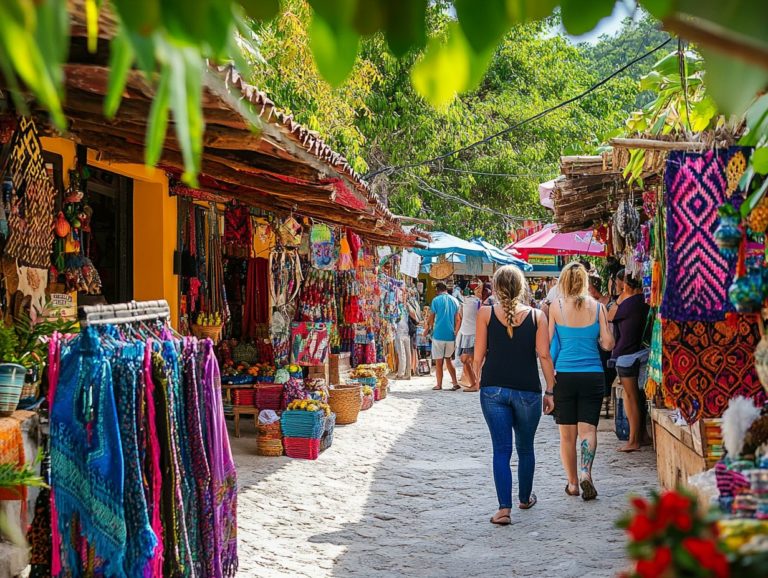7 Ways to Leave No Trace While Traveling
Traveling provides a remarkable opportunity to immerse yourself in the beauty of nature. However, it is essential to do so in a manner that safeguards the environment for generations to come by following the Leave No Trace principles.
This article outlines the Seven Principles of the Leave No Trace ethic, designed to help you reduce your impact while enjoying the great outdoors.
From thoughtful planning to honoring wildlife, each tip aims to deepen your connection with nature and promote responsible outdoor behavior.
Explore how you can travel sustainably and create a positive impact on the world around you through responsible outdoor ethics!
Contents
- Key Takeaways:
- 1. Plan Ahead and Prepare
- 2. Dispose of Waste Properly
- 3. Leave What You Find
- 4. Respect Wildlife
- 5. Be Considerate of Other Visitors
- 6. Minimize Campfire Impacts
- 7. Travel and Camp on Durable Surfaces
- What Is the Leave No Trace Principle?
- Why Is It Important to Practice Leave No Trace While Traveling?
- How Can One Minimize Their Environmental Impact While Traveling?
- What Are Some Common Mistakes Travelers Make That Harm the Environment?
- What Are Some Tips for Responsible Camping and Hiking?
- How Can One Educate Others on the Importance of Leave No Trace?
- Frequently Asked Questions
- What are the 7 ways to leave no trace while traveling?
- Why is it important to leave no trace while traveling?
- How can I plan ahead and prepare to leave no trace while traveling?
- What are some ways to travel and camp on durable surfaces while leaving no trace?
- How should I dispose of waste properly to leave no trace while traveling?
- What are some ways to respect wildlife while leaving no trace while traveling?
Key Takeaways:
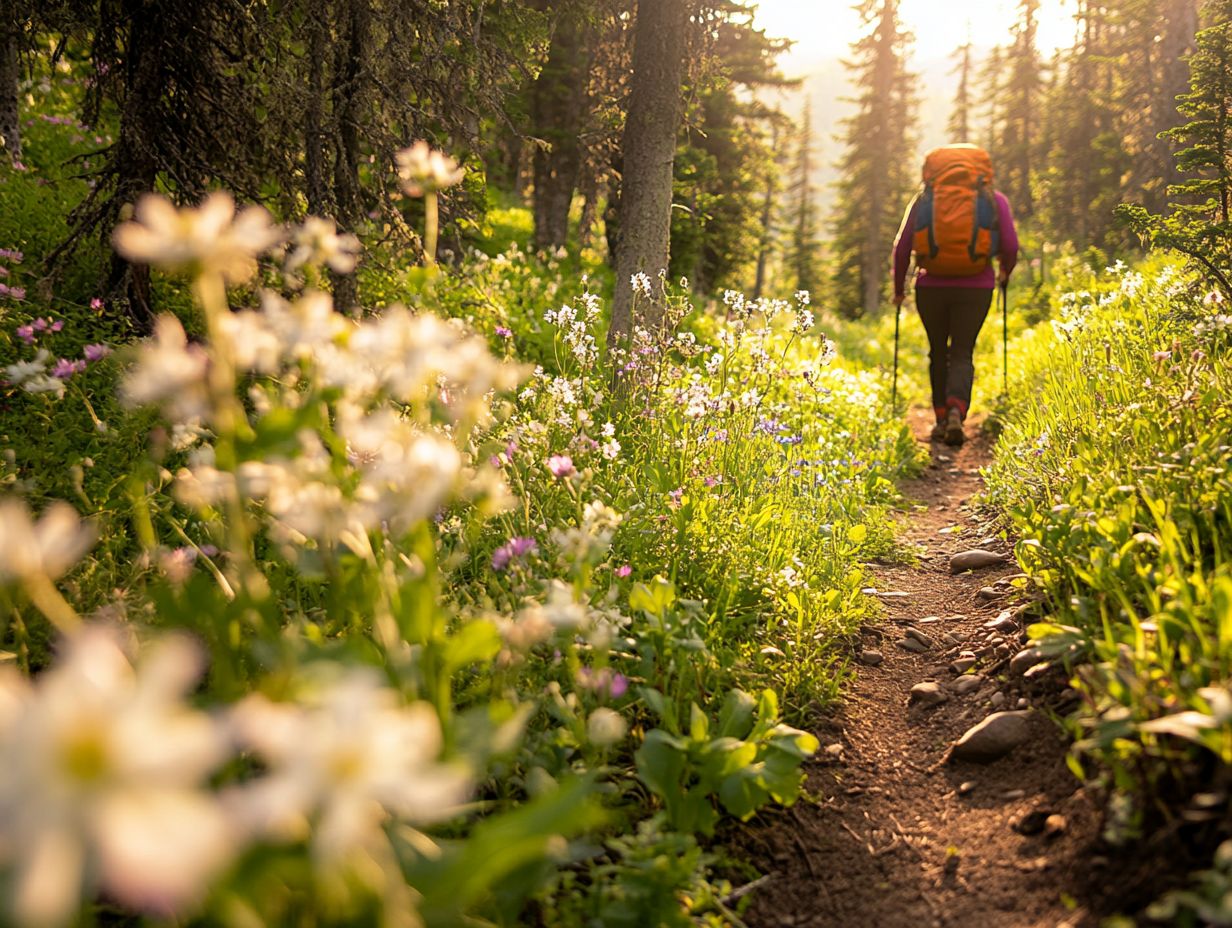
- Prepare and plan ahead to minimize waste and potential harm to the environment while traveling, ensuring responsible camping practices.
- Dispose of waste properly and leave what you find to preserve the natural beauty of the area.
- Respect wildlife, be considerate of other visitors, and minimize campfire impacts to maintain a sustainable travel experience.
1. Plan Ahead and Prepare
Planning ahead and preparing for your outdoor adventure is essential for promoting responsible outdoor behavior and minimizing environmental damage. A well-prepared trip not only ensures your safety but also enhances your experience in the wilderness.
This allows you to enjoy nature responsibly while adhering to the principles set forth by the Leave No Trace Center for Outdoor Ethics, the US Forest Service, and other organizations like the National Park Service and the Boy Scouts of America.
Researching trail conditions before embarking on your hiking adventure helps you understand what to expect, including any potential hazards or necessary permits. It s also vital to familiarize yourself with park rules, which can vary and often include guidelines on wildlife interactions and campfire regulations.
Packing the right hiking gear, such as sturdy footwear and weather-appropriate clothing, is crucial for your comfort and safety. Assembling a first aid kit tailored to your group s needs ensures you are ready to respond quickly to minor injuries, which is particularly vital for beginner hikers. This thoughtful preparation not only enhances your enjoyment but also aligns seamlessly with Leave No Trace principles.
By encouraging a respectful approach to the natural environment, you help ensure that nature remains beautiful for those embarking on their hiking journeys for the first time.
2. Dispose of Waste Properly
Proper waste management stands as a cornerstone of the Leave No Trace principles. As a responsible hiker or camper, you should pack it in and pack it out. This simple practice prevents environmental damage and preserves the breathtaking beauty of our wilderness areas.
Effective trash disposal methods are essential for maintaining the integrity of these precious environments and promoting responsible hiking practices. By using biodegradable soap for washing dishes, you minimize chemical contamination and ensure that any leftover suds break down naturally, further protecting local ecosystems.
Opt for durable surfaces for waste management; they help prevent litter and encourage proper disposal practices. However, it’s easy to make mistakes, like leaving food scraps behind or neglecting to secure trash, which can lead to unwanted wildlife encounters and pollution.
To sidestep these pitfalls, carry designated trash bags and stay vigilant about cleaning up after yourself. This commitment fosters a more sustainable outdoor experience for everyone involved, emphasizing the importance of outdoor education.
Let s dive into the incredible ways you can protect nature while enjoying your adventure! Start planning your next journey today with these essential tips to protect our beautiful planet!
3. Leave What You Find
The principle of leaving what you find, part of the Leave No Trace ethos, is vital for preserving nature. It encourages outdoor enthusiasts to respect and protect natural resources while immersing themselves in the wilderness. This aligns beautifully with the Leave No Trace guidelines and the broader ethos of environmentalism.
By choosing not to disturb artifacts, plants, and historical items, you contribute to maintaining the delicate balance within ecosystems. This allows plants and animals to thrive undisturbed. When people remove resources from these natural spaces, it can lead to habitat destruction and disrupt the food chain, ultimately harming wildlife and the environment. This highlights the need for environmental protection.
Sharing insights about the consequences of removing natural treasures fosters a culture of stewardship. Everyone can recognize their role in safeguarding these fragile ecosystems and participate in outdoor experiences that are mindful of nature. This can inspire more people to appreciate and preserve the wonders of nature for generations to come.
4. Respect Wildlife
Respecting wildlife is essential for maintaining the delicate balance of ecosystems. It s important for you as a hiker or camper to minimize your effects on the environment by avoiding the temptation to feed animals human food and instead observing them from a safe distance.
When people feed animals human food, it can alter animal behaviors. They may seek out more human sources of sustenance instead of foraging for their natural diet. This shift jeopardizes their health and disrupts the food chain, creating imbalances in local ecosystems.
Proper food storage is imperative. Utilizing bear-proof containers (which are designed to keep animals from accessing food) and adhering to guidelines from local authorities can significantly reduce unwanted wildlife encounters. This ensures camping etiquette is followed at all times. The US Forest Service recommends keeping food out of reach and disposing of waste responsibly, as these practices protect both wildlife and yourself.
Recognizing the role of wildlife in maintaining ecosystem health serves as a reminder of the interconnectedness found in nature.
5. Be Considerate of Other Visitors
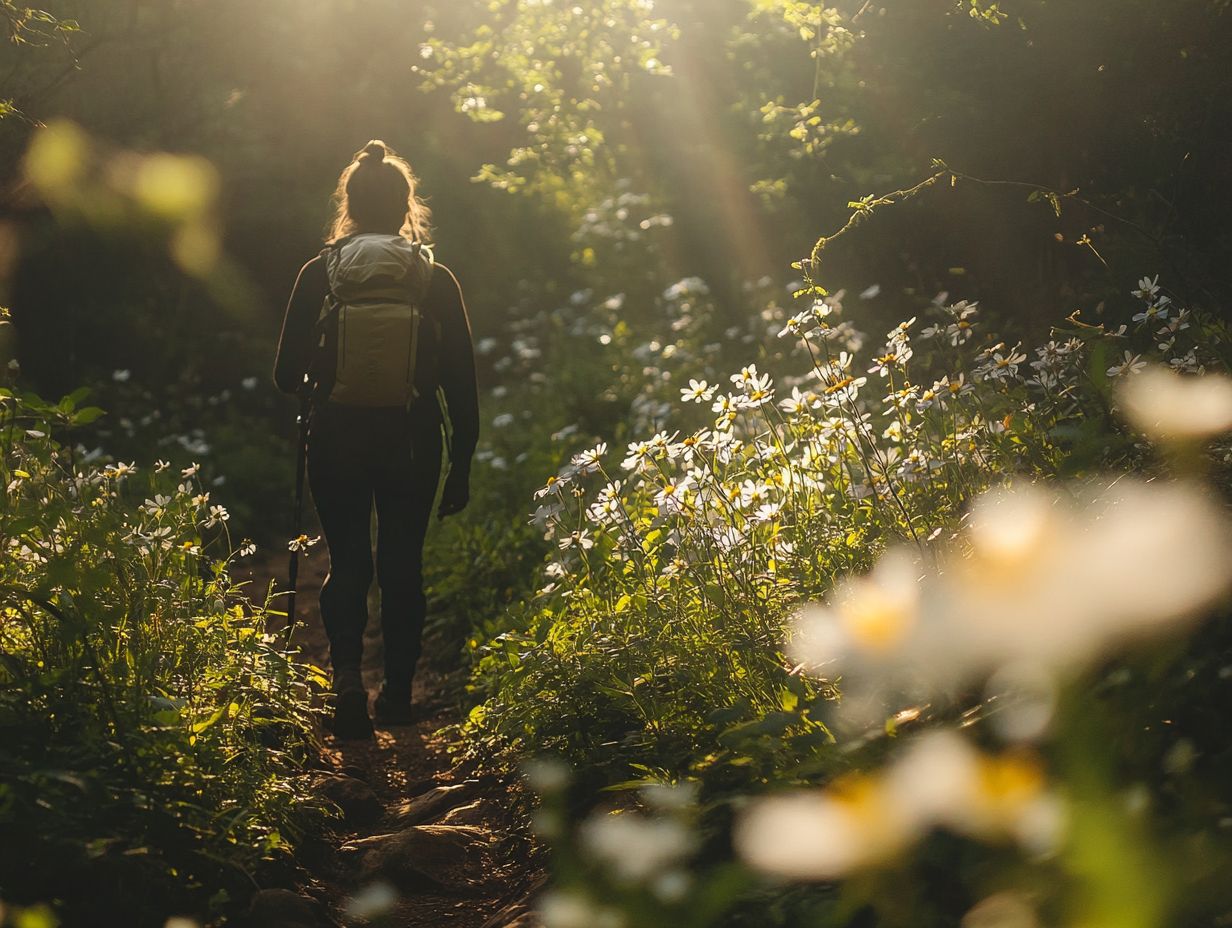
Practicing consideration for fellow visitors significantly enhances your outdoor enjoyment while fostering a sense of community among hikers and campers. Trail etiquette is crucial; it ensures everyone enjoys the wilderness.
When navigating popular paths, it s essential to yield to those climbing uphill, granting them the right of way as they tackle the more challenging ascent. Keeping your conversations at a low volume while enjoying the sights is equally crucial. This respects the tranquility of nature and allows others to immerse themselves in the experience without disruption.
Being mindful of personal space is vital, especially in crowded areas where encounters are frequent. Embrace these simple practices to enrich your outdoor experience and protect nature, encouraging an atmosphere of respect and cooperation that amplifies the joy of exploring these breathtaking natural landscapes.
6. Minimize Campfire Impacts
Minimizing campfire impacts is vital for safeguarding the environment. Improper fire management can lead to ecological damage, so adhering to Leave No Trace principles regarding campfire safety strikes a perfect balance between enjoying the warmth and beauty of a fire and preserving the wilderness.
Using established fire rings is a critical step in maintaining this delicate balance and ensuring the natural beauty of the area is preserved. They help contain fires and prevent harm to surrounding vegetation. If you’re looking for a more efficient option, camp stoves provide an excellent alternative, reducing the risk of wildfires while still allowing you to cook.
It s essential to be aware of local regulations related to fire use, especially during dry spells when many areas impose restrictions to prevent catastrophic wildfires. By understanding and following these guidelines, you can contribute to the protection of fragile ecosystems, ensuring that future generations can safely enjoy the great outdoors.
7. Travel and Camp on Durable Surfaces
Traveling and camping on durable surfaces is crucial for minimizing your impact in the wilderness, which helps prevent trampling of vegetation and trail degradation while aligning with Leave No Trace principles.
Durable surfaces include established trails, rocky outcrops, and gravelly areas. These provide a stable foundation for your outdoor activities and minimize vegetation trampling. When you stray from these designated zones, the delicate balance of local ecosystems can be disrupted, leading to potential environmental damage. Fragile plants may be crushed underfoot, soil erosion can take hold, and wildlife habitats could suffer.
That s why it s essential to choose appropriate sites while considering the long-term health of your surroundings. Always think about the need for trail access for future adventurers. Sticking to established paths enhances your personal safety and preserves the natural beauty of the land for those who come after you.
What Is the Leave No Trace Principle?
The Leave No Trace principle offers a suite of guidelines designed to cultivate outdoor ethics and environmental awareness. It centers around seven core principles that empower you to minimize your impact while enjoying nature and preserving it for future generations.
Embrace this culture of responsibility. Think critically about your actions in natural spaces. Each principle is a key idea for responsible outdoor behavior, guiding you from planning ahead and preparing thoroughly to respecting wildlife and sticking to established trails.
Understanding these guidelines is essential for enhancing your experiences in the wild. They also help ensure that these treasured environments remain accessible for countless others in the future, promoting environmental awareness. Education and awareness of these principles empower you to act responsibly and safeguard the beauty of nature through the importance of leaving no trace while traveling training.
Why Is It Important to Practice Leave No Trace While Traveling?
Practicing Leave No Trace while traveling is essential for protecting nature. It ensures that your outdoor adventures don t compromise the landscapes you cherish, fostering a sense of stewardship and responsibility among fellow outdoor enthusiasts.
By embracing these principles, you contribute to the preservation of stunning scenery and diverse ecosystems for future generations to enjoy. For instance, when you minimize campfire impacts and diligently pack out your trash, you re not just maintaining the natural beauty of the mountains; you re also enhancing the experience for fellow adventurers in the wilderness.
This thoughtful approach cultivates a culture of mindfulness, encouraging shared responsibility that results in cleaner trails, healthier wildlife, and more vibrant environments.
Ultimately, the long-term benefits of adhering to Leave No Trace principles create a ripple effect through communities, fostering a legacy of care and appreciation that unites everyone who ventures into the great outdoors. Join the movement and become a steward of the wilderness!
How Can One Minimize Their Environmental Impact While Traveling?
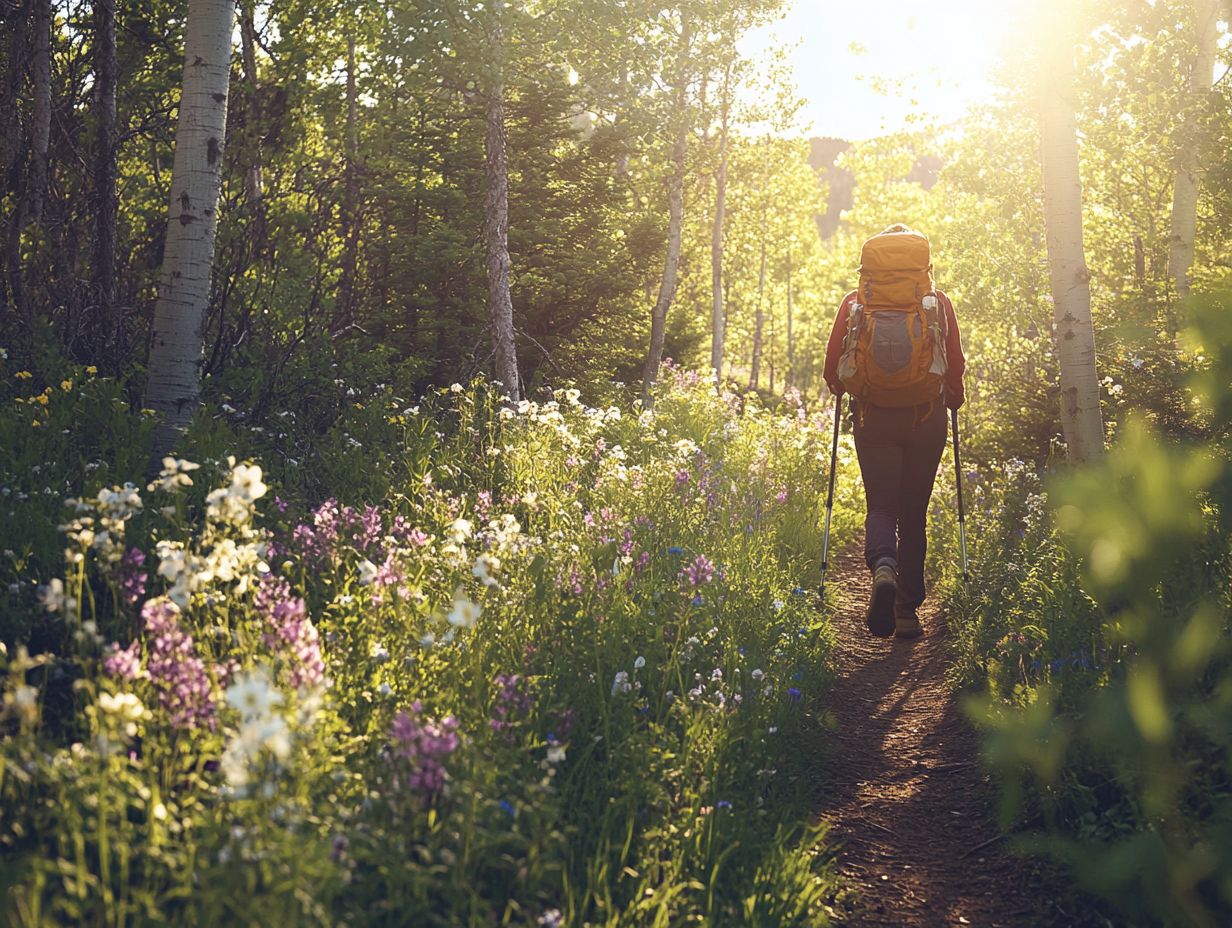
Minimizing your environmental impact while traveling requires a conscious commitment to adopting practices that align with Leave No Trace principles. These principles are a set of guidelines aimed at minimizing environmental impact while enjoying the outdoors. Ensuring that your adventures leave the ecosystems you explore unscathed includes proper waste management and trash disposal.
You can make a significant contribution by sticking to established trails. This helps prevent unnecessary erosion and habitat destruction. Opting for biodegradable products, including soap and toiletries, ensures that harmful chemicals don t seep into nearby water sources, safeguarding local wildlife.
By properly managing your waste and packing out everything you bring in leftover food and packaging included you minimize litter and help preserve the stunning beauty of natural spaces.
It s essential to recognize that your actions, when combined with those of others, can foster a healthier environment for future generations. This commitment cultivates a culture of sustainability and respect for nature that benefits us all.
What Are Some Common Mistakes Travelers Make That Harm the Environment?
Want to minimize your impact while enjoying the great outdoors? Common mistakes travelers make often lead to environmental damage. Improper waste disposal and a lack of respect for wildlife threaten the integrity of our cherished natural areas. If you’re a beginner hiker, knowing these common mistakes can make a big difference!
To address these issues, it s vital for outdoor enthusiasts like yourself to embrace responsible camping practices. Ensuring that you collect and properly dispose of all trash significantly reduces your impact on the environment. Keep a respectful distance from wildlife and educate yourself on local regulations to help protect the ecosystems you cherish.
Even the smallest actions like picking up litter left by others or keeping noise levels low can collectively create a substantial impact. By cultivating a culture of stewardship, you can revel in the beauty of nature while ensuring its preservation for future generations.
What Are Some Tips for Responsible Camping and Hiking?
Responsible camping and hiking rest on your ability to implement essential tips that align with Leave No Trace principles. This approach allows you to fully enjoy your outdoor adventures while preserving the wilderness for generations to come. Always be aware of park rules when venturing out.
To begin, selecting the right hiking gear is paramount. Not only does it enhance your safety, but it also minimizes your environmental impact. Lightweight, durable items can ease the strain on the land while ensuring your comfort.
Planning your meals in advance can significantly reduce waste. Choosing minimally packaged foods or opting for bulk items will help lessen your overall impact.
Engaging with Leave No Trace training resources can provide you with invaluable insights into responsible practices. Learning these practices helps you protect nature and respect the environment, further enhancing your skills as a responsible hiker.
By prioritizing these practices, you play a vital role in preserving the landscapes you cherish. Act now to help protect our beautiful landscapes!
How Can One Educate Others on the Importance of Leave No Trace?
Educating others about the importance of Leave No Trace is essential for helping people understand the environment. Engaging organizations like the National Park Service and the Boy Scouts of America can amplify your efforts.
By organizing workshops, you create engaging, hands-on learning experiences that highlight the principles of responsible outdoor behavior. Leading by example during hiking trips showcases your commitment to these values and serves as a compelling motivator for your peers to embrace environmentally friendly habits.
Utilizing resources from reputable organizations like the Leave No Trace Center for Outdoor Ethics equips you with tools and materials that deepen understanding. Every person you educate adds to the movement for preserving the environment for future generations, ensuring that our outdoor spaces remain pristine and enjoyable for all by practicing responsible hiking.
Frequently Asked Questions
What are the 7 ways to leave no trace while traveling?
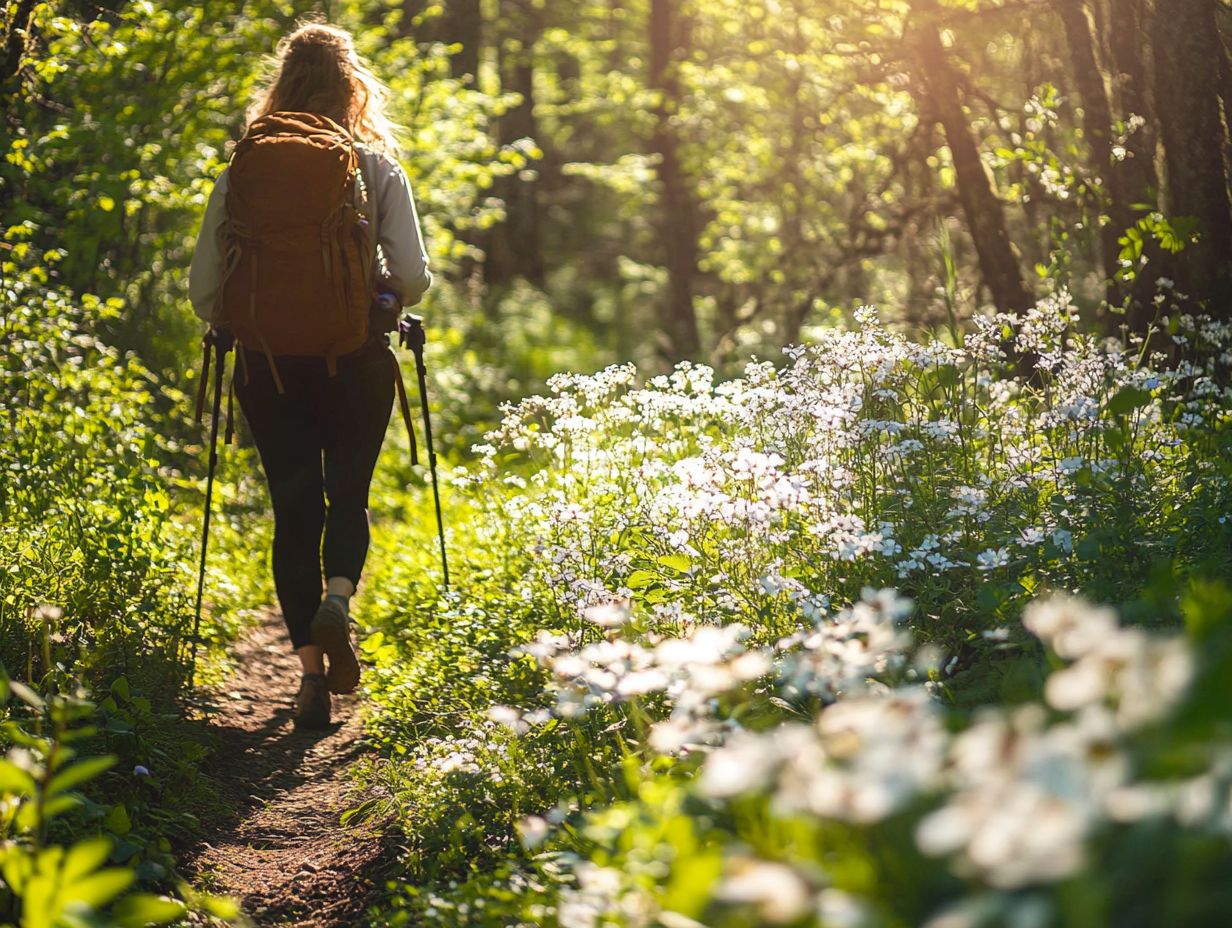
The 7 ways to leave no trace while traveling are: plan ahead and prepare, travel and camp on durable surfaces (like gravel or rock), dispose of waste properly, leave what you find, minimize campfire impacts, respect wildlife, and be considerate of other visitors.
Why is it important to leave no trace while traveling?
Leaving no trace while traveling helps preserve the natural environment and wildlife, maintains the beauty of the destination, and ensures that future travelers can also enjoy the same experience. Caring for nature is crucial! Every effort counts.
How can I plan ahead and prepare to leave no trace while traveling?
You can plan ahead by researching the destination, understanding the rules and regulations, packing light and only bringing what you need, and being aware of weather conditions and potential hazards. Use helpful hiking tips to enhance your outdoor experience.
What are some ways to travel and camp on durable surfaces while leaving no trace?
You can travel and camp on durable surfaces by staying on designated trails and campsites, avoiding fragile ecosystems, and using existing fire rings and tent sites. Understanding trail access is also crucial.
How should I dispose of waste properly to leave no trace while traveling?
You can dispose of waste properly by packing out all trash and litter, properly disposing of human waste, and minimizing the use of soap and other chemicals in natural water sources. This includes trash packing and proper trash management.
What are some ways to respect wildlife while leaving no trace while traveling?
Respect wildlife by observing them from a distance. Never feed or approach animals. Keep your food and trash secure to avoid attracting them. Make sure to keep your food secure it’s vital for both you and the wildlife!





